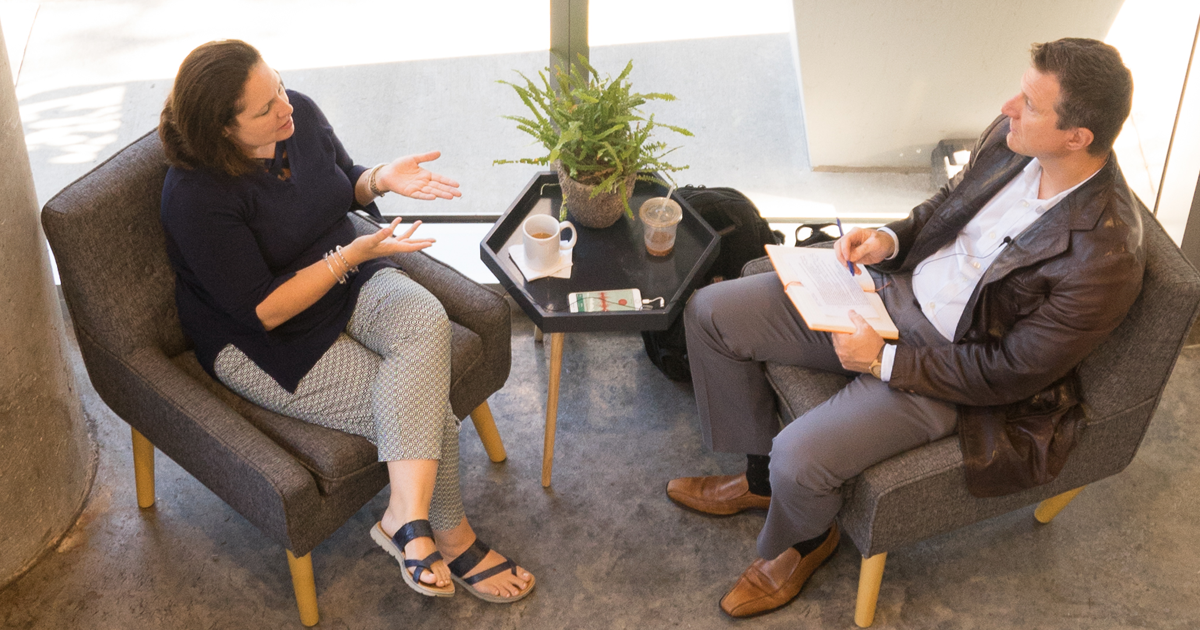Several years ago I had a meeting with a digitial marketing company called .Com Marketing at their office here in Orlando, Florida. Although I didn’t meet Hillary Bressler (founder of .Com Marketing) during that visit, I knew of her. Shortly afterward, I happened to be in the line at Starbucks when I overheard two people speaking about Hillary. What caught my attention was what one person said about her:
“She has a sterling reputation.”
That stuck with me. I don’t know why, but that looped in my mind for a while.
When I started Outrageously Remarkable I noted to myself: ‘I need to meet the founder of that pioneering digital agency. She has a sterling reputation!’ It’s funny how hearing two strangers talk can anchor your thoughts, right? The more research I did into her the more I realized that they were right. Hillary does have a great reputation. She is a visionary entrepreneur who founded one of the first marketing agencies focused on internet marketing, anywhere. She saw this coming at a time that was before high-speed internet, laptop ubiquity and smartphones! It seems so obvious to all of us now but imagine the headwinds she had to charge into. The internet was a fad they told her … kind of like social media has ended up being a fad, right? [/sarcasm]
Thanks to the serendipity of LinkedIn, I was able to connect with Hillary after her name popped up on my feed this past year. We had coffee together and I enjoyed talking shop with her. We agreed to do an interview & so here we are, 20 years after she founded .Com Marketing! Let’s take a stroll down memory lane and launch into the future.
[Setting: I met our photographer Josh at Credo Health Village coffee shop and we discussed the unique angles the venue had for pictures. Hillary arrived shortly thereafter, we briefly discussed a few of the topics I wanted to go into, and we attached our lavaliere mics while sitting across from each other. I knew we were in a high traffic location but it was also the best place to have a private conversation.]
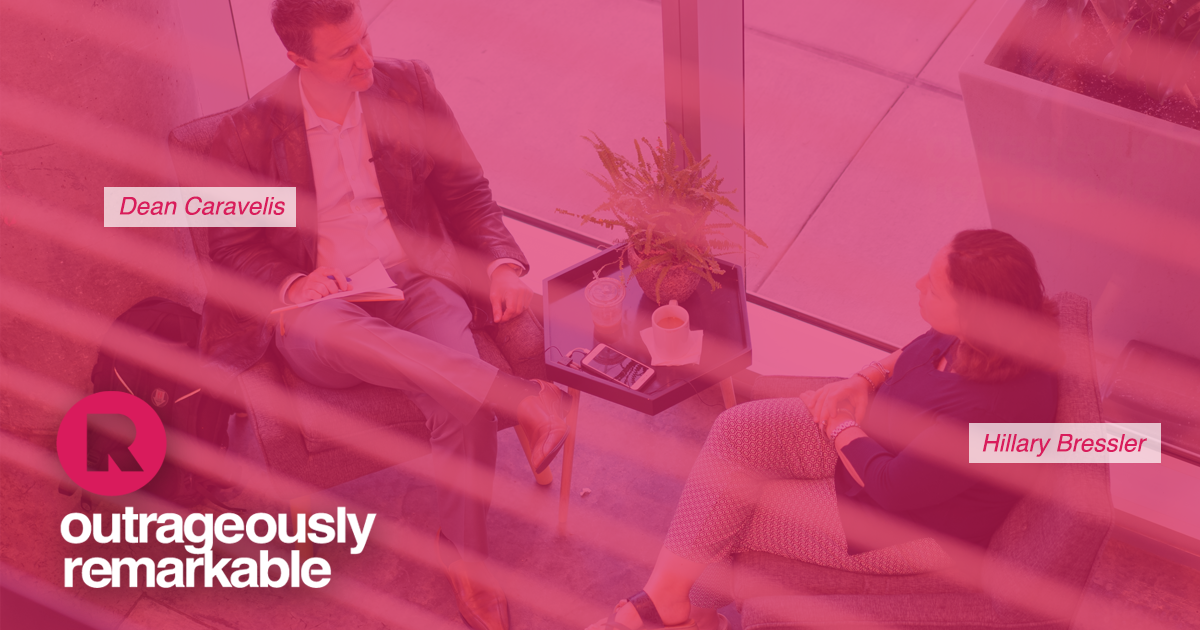
Dean: Thank you so much for meeting with me. I wanted to start off by saying that you are a true digital pioneer with .Com Marketing. What was the insight that led you to found the agency?
Hillary: I grew up with entrepreneurial parents and I had that spirit and so when I graduated from college, my thoughts started spinning on what I could do. I was working at the Golf Channel at the time, in advertising. I knew very early on that I wanted to do advertising. In 1995, I read Broadcasting Cable magazine, which came to our office, and there was an advertisement on the internet. That was the first time that I had read about it and I just became obsessed. I went out and bought a computer, I think it was like a $2,000 or $3,000 computer at the time, and I surfed the entire internet at the end of 1995. I realized that there were a lot of websites being built, but there was no one marketing them. Since my specialty was advertising, I just dove in. I was very passionate about the internet, obsessed, to the point where I was like I have to do something in the internet industry. I saw one company that was a website promotion company, that’s what they called it back then. Now it’s digital advertising agencies, but anyway, I went for it. I put quite a bit of money into my first website. I hired a company and spent about $3,000 on a website, which back then was a lot. I started to do speaking engagements because a lot of people didn’t know what it was and I was very good at simplifying complex ideas. I started getting business right away.
“You know that’s a fad, right?”
Dean: Do you remember one of your first customers? Or what type of business they were?
Hillary: Funny enough it was an antique business that liquidates estates. It’s funny because here we have the internet marketing antiques. She was an innovative lady, so, that was the first.
Dean: Did the people around you when you started .Com Marketing think that the internet was a fad?
Hillary: They did! For probably the first two or three years, so from 1997-1999, I remember going to a business networking event and a gentleman came up to me and I told him what I was doing and he said, “You know that’s a fad, right?” I said, “Oh, really?” and I think I just laughed and walked away from him. I shook my head because I knew. There was no doubt in my mind that this was it.
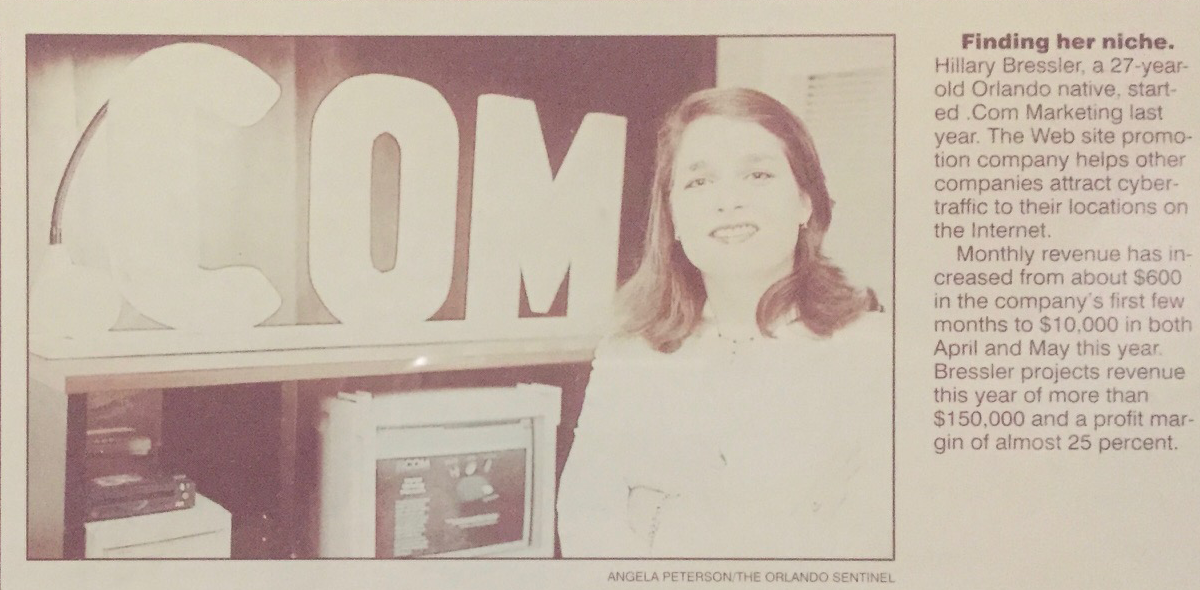
Dean: I imagine there were also a lot of people on the fence. Was educating your customers your main challenge at first?
Hillary: The name of my company was .Com Marketing, but after awhile, I started calling it .Com University [laughs]. That’s really all I did from the very beginning. I was explaining what search engines were, what keywords were, what “www” means … giving lessons on how to search, set up your email … I was a teacher for a long time. There were people who easily embraced it and got it and then there were people who just resisted all the way through. It was the clients who embraced it that really catapulted their business. Because we were here in Orlando, we had a lot of hotels, travel/hospitality businesses. There was a fairly large number of franchises of Days Inn in Orlando that hired me in 1997 and about 1999, when SEM, the pay-per-click came out. We were doing ad banners for them. Spending quite a bit of money running ad media. It was working, but I pitched the pay-per-click to them and I remember the keyword Orlando Hotel was bidding at like 8 cents a click and they thought, that could really add up. But they did it. And they went for it. They were one of the first in Orlando and anytime you type in ‘Orlando hotel’, they were number one for a few years. Now, it’s … gosh, I don’t even know … numerous dollars per click. So, I felt like I had an insight to what worked and what didn’t. Like, for instance, podcasts. Podcasts now are coming into their own, but this was 15 years ago and they weren’t. People didn’t have the phones and the technology to listen to it. Some of them didn’t have speakers on their computer. Clients loved the ideas of podcasts and we said, we can do it, but it’s not going to drive business for you. If you want me to direct business, then I need to move you over here. So, I had a very good vision of what worked before the rest of the U.S.
… find the most influential bloggers in the Orlando area
Dean: I wanted you to give yourself credit for a bold assertion that you made in the 90s that ended up being correct. I know you mentioned a couple there between the banners and the relevance of podcasts, but is there an assertion that you felt like you were making early on that maybe others didn’t really believe in that ended up being correct?
Hillary: Just that we were one of the first internet advertising agencies in the U.S., if not the world, really. I had insight in knowing that ad dollars were going to continue being pulled away from traditional into digital. Even at the time, the Orlando Sentinel was one of our early clients, and I saw the challenges they had up ahead …
Dean: I think it’s fascinating that one of your first clients is part of an industry that represented, to many people, the antithesis of the digital age. Primarily because digital endangers its traditional core business.
Hillary: They were very innovative at the beginning. They did Digital City, they did Go To Orlando, OrlandoSentinel.com. They had numerous properties, but they were selling digital advertising incorrectly. They were giving it away if you bought print, so it devalued that. But yeah, it’s interesting because sometimes the first out of the gate isn’t always the winner.
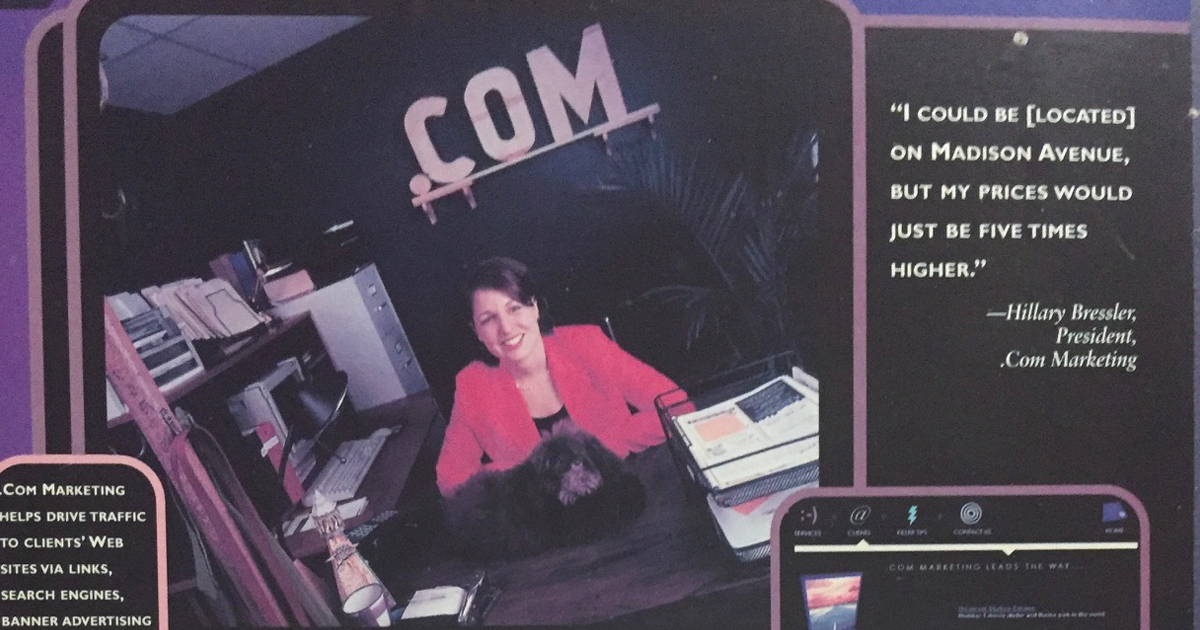
Dean: Is there a project that stands out in your mind in the 17 years with your agency as the most remarkable project that you worked on?
Hillary: Internet, pay-per-click, Google advertising … it’s not sexy. Pay-per-click is not sexy, it’s text. You couldn’t be super creative at the time with internet advertising. Now, the bandwidth is bigger and you can do video and other cool things, but back then, it was hard to be innovative. But one project was for TR Grill, Tony Romo’s had a new concept for TR Grill, and it was an innovative concept with crafted cocktails and chefs and things like that. What we did was a blogger party and I convinced the client that if you want to get the word out quickly, let’s go through social media and let’s get writers who are passionate about food and craft cocktails …
Dean: What year is this around?
Hillary: I would say, 2012 or 2013. And so we put together a campaign in order to find the most influential bloggers in the Orlando area and we invited them to the restaurant. We flew down the chef from headquarters. We gave them an experience, we asked them questions, we asked for their insight, and then we gave them an incentive to write with no restrictions. If they wanted to write something bad, they could. Within the first 24 hours, we had a million impressions, so there was some cost, but it was a great investment. Within the week, I don’t even remember the numbers, but it was amazing.
… I want to sit at a full table.
Dean: Those are amazing results!
Hillary: And then all of those blogs still exist today and are still driving traffic. So it was one of the first times that we were able to merge influencers, social media, and driving traffic where it benefited everybody. It wasn’t cheesy, it wasn’t buying your way in … it was authentic and it offered the company insight that they might not have received otherwise. So that was exciting. We also did Van Gogh Vodka. It was a website redesign and marketing. We really nailed that one. The site won awards and that was a pretty exciting project.
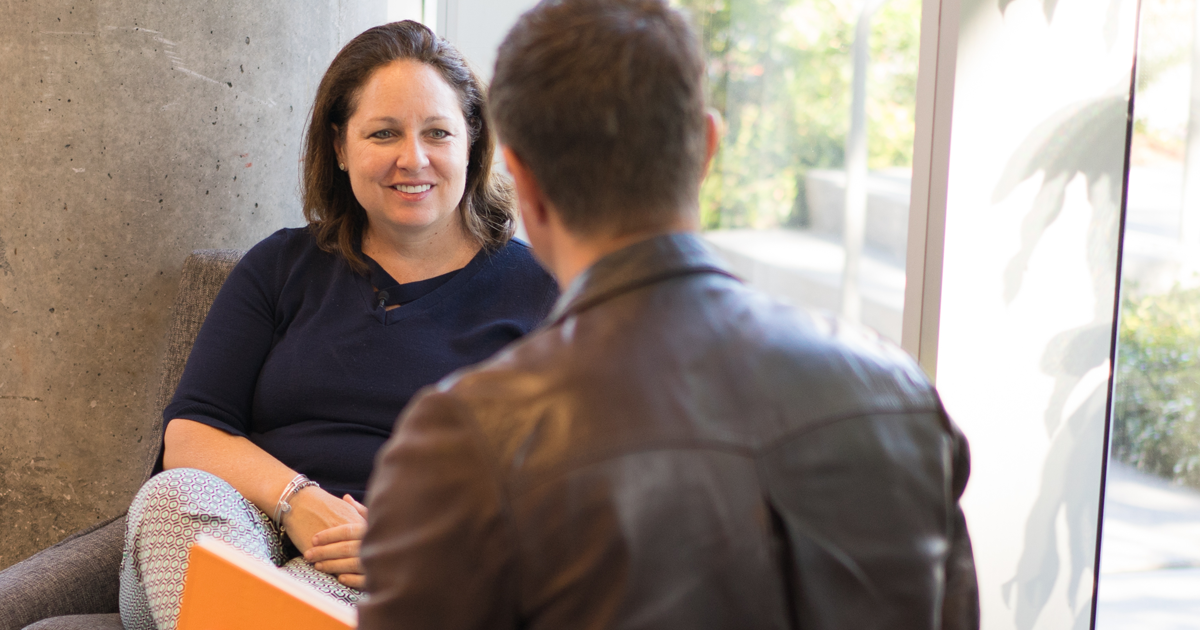
Dean: So, I know you did a lot of networking at conferences to help build your business. You’ve been kind of teasing some of these tips on LinkedIn. Can you mention to me a couple of ones that I can share with my readers?
Hillary: Sure. One of the things when you go to a conference and you don’t know anybody, it’s intimidating, even if you’re an extrovert … it’s hard to walk up to somebody and introduce yourself. So I came up with tips on how to navigate that. One of the easiest ways is that during the breakfast, lunch, or dinner, you go to a table and sit down. So one of the tips is that when they open up the doors for the luncheon, I’m one of the last to walk in, mainly because I want to sit at a full table. They usually have round tables of ten and I’ll look for a table that has nine and then I’ll sit down because I want the opportunity to meet nine people. I learned that when once, I sat down at a table with only one other person and that one other person could be a great contact, but your odds are better if you have an opportunity to meet nine other people.
Dean: Are there any good questions you could ask at that table to create conversation?
Hillary: Yeah, one of the things I noticed is that right when you first sit down is your only real opportunity to make a connection, so don’t pretend that you’re invisible, which is hard. So immediately when I go to the table, I say, “May I join you?” I look around the table and I tell them my name and my company and the city. That creates the opportunity for them to say, “Oh, I just came back from Orlando” or “My daughter lives in Orlando, where are you from?” I have also found clients in elevators. When I go to a conference, I like to ask for the top floor, especially if I’m in a big city like New York or Chicago, because you have the lanyard with your name and you can tell who is with you at the conference. You’re in that elevator sometimes five-plus minutes, up and down, and many times you create conversations by asking how they’re enjoying the conference or the speaker … whatever it is, you can look at the person’s name tag and create conversation. I find it a capsule of being able to meet somebody. As simple as that sounds, I’ve definitely gotten clients that way.
… the dot com bomb, 9/11 and 2008
Dean: [laughs] That’s where the term elevator pitch came from, right? If I could add one thing to that, some really successful trade show folks that I’ve worked with mentioned to me that it’s not how many business cards you give out, it’s how many you get because there are so many of these conferences where people are concerned with giving out as many cards as possible, but really, you need other people’s information because the follow up is the most important thing. I think that’s a fundamental point that most people miss when they’re spraying cards out everywhere.
Hillary: I was never one to go up and say, “Hi, I’m Hillary, here’s my business card.” It’s usually the last thing I give out because you want to create a rapport and build some trust before you exchange cards.
Dean: You mentioned that you were going to put some of these thoughts about networking at conferences in some kind of format, so when you do, please reach out to me and I’ll put a link up for my readers as well.
Hillary: I always thought that because I was shy growing up, it was something that I had to overcome, but I think even extroverts sometimes struggle with walking into a room where you don’t know anybody and you’re tasked with drumming up business and not in a “badda bing, badda boom” way, you know …
Dean: Hillary, what was the biggest hump you had to overcome?
Hillary: It was three of them. The dot com bomb, 9/11, and 2008, where my business took a slump and I had to crawl back out of it. Three times in 15 years is a lot.
Dean: It is a lot, but those were all external events. It just proves the longevity of the business because you’ve gone through those different cycles.
Hillary: Not giving up is a good thing, but it can be a bad thing, too. Sometimes, things don’t work out and you need the strength to say this isn’t working out and I’m moving on. But I’m creative and I’ll come up with 20 ideas in two minutes and try to figure it out, so in some cases, it was a strength and in some cases, it was a weakness.
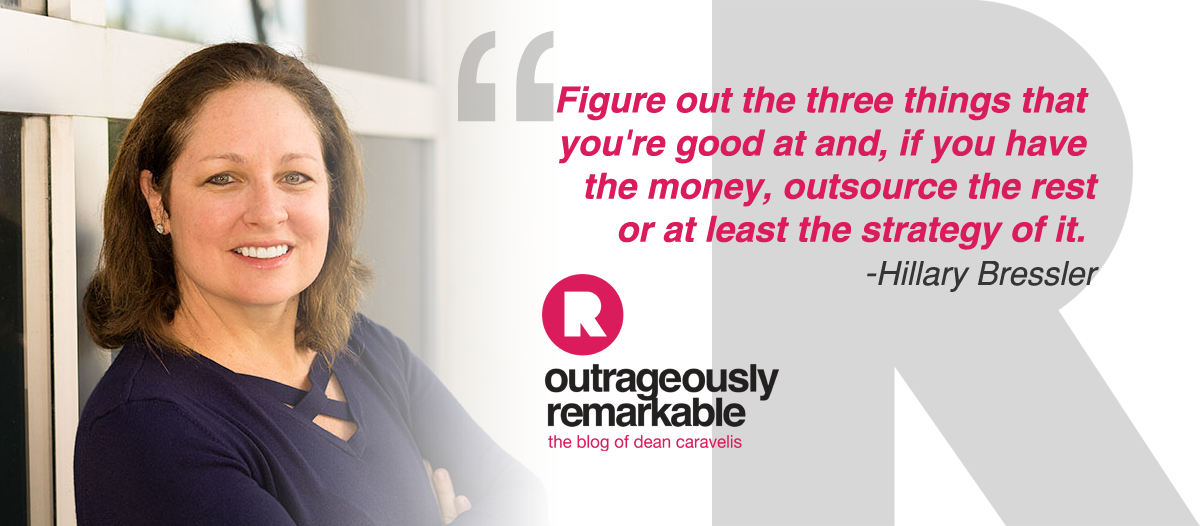
Dean: So I recently read that you turned down the position of CEO for a company whose mission you totally believed in. I’m guessing that it wasn’t inline with your vision for what’s next for you. Can you tip us off on what direction you’re looking to go with your career?
Hillary: I feel like I’m a visionary and I was able to find something that hadn’t taken off yet while knowing that it was going to, so I’m looking at opportunities that don’t exist while being something that I’m passionate about. One of the areas that I’m passionate about is travel, in particular, family travel, which I think is grossly ignored in the industry. So I’m looking at going down that path. On the other side, I’m very passionate about startups. The company that I was going to join was a startup, so that’s something that I’m looking at as well. Looking at a startup that needs a CEO or a CMO and to help them. I’m born and raised in Orlando so I have a passion for helping businesses in Orlando. I feel that between UCF and Full Sail and some of the entrepreneurial organizations here, we’re primed to take off from a startup standpoint.
Dean: If you could send a candid message to another pioneering entrepreneur that is just now starting day one, to give them some of your wisdom, what would that message say?
Now, his company is worth billions.
Hillary: Really, you have to work your tail off, especially in the beginning, which means working 12-14 hours days, weekends. I was acting as the position of four or five people. I was doing sales, I was implementing, I was doing the accounting. Also, making decisions quickly as opposed to putting things off … and outsourcing the things that you’re not good at. One of the mistakes that I made in the beginning was falling into the trap of the ‘do it yourself’ mentality. I bought Quickbooks and I set it up myself because it presented itself like that. It wasn’t until maybe a couple of years later that I hired a bookkeeper and it turns out that I didn’t set it up properly, so it was kind of a mess. Hindsight 20/20, finance was not my degree and I wish I would have outsourced something like that, at least just to set it up. I find that I’ve had engineers and lawyers as clients and they want to do the marketing, but they’re just not good at it. Figure out three things that you’re good at and, if you have the money, outsource the rest or at least the strategy of it.
Dean: And having the awareness of what your personal limitations are, right? I think that some of the groups of people you’ve mentioned there are very smart and because of their brains, they think that they can figure it out instead of outsourcing what goes beyond your limitations.
Hillary: [laughs] It’s a bit of a narcissistic quality. I also find that it happens even with bigger companies. With like Google and pay-per-click, I would say that a majority of business that I received were businesses that tried to do it themselves and the CEO or President was bidding on keywords because they didn’t want to pay somebody to do it, and then when they moved it over to us, even though they had to pay us to do it, their conversions and sales went up and we were able to scale it, and they always said, “I wish I would have come to you sooner, I wasted so much money.” So, you know, as they say, you have to spend money to make money. Google and WordPress have a do it yourself mentality, but it’s not the right way to go when you’re developing a serious business.
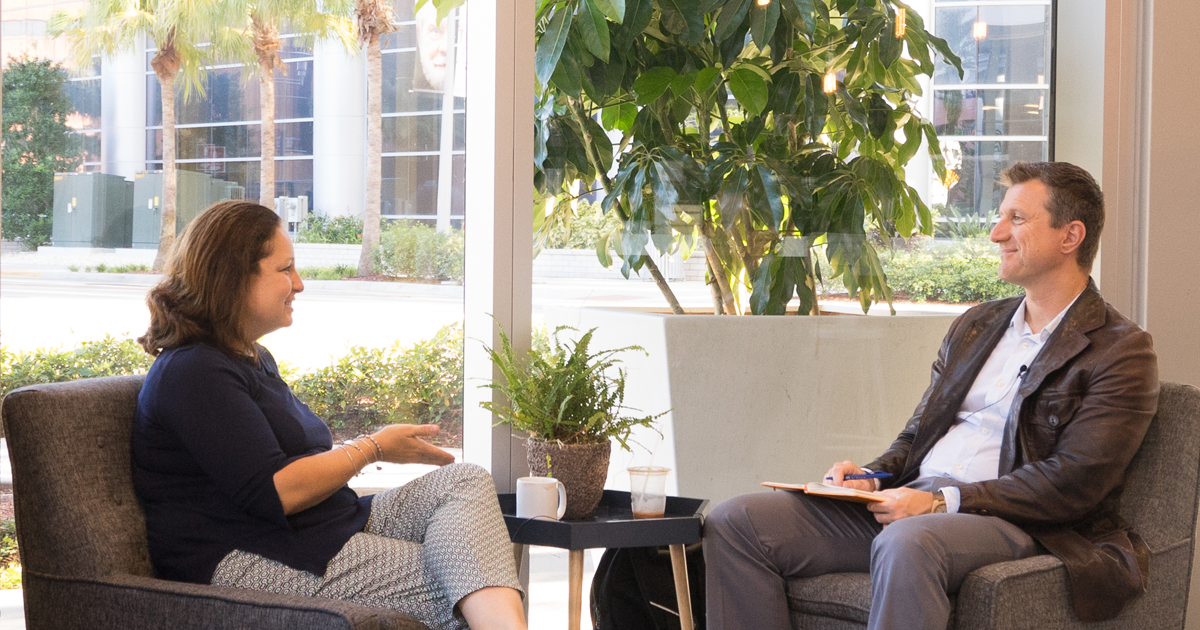
Dean: Who is the most remarkable person you’ve ever met and why?
Hillary: I actually just met him last week. David Zalik and he’s on the cover of Forbes this week. I went out to Aspen, Colorado, for a fundraiser and he was the speaker. He is listed in the top 100 most innovative companies by Forbes. He owns a company called GreenSky and the speech that he gave was about how he failed over and over and over in previous businesses and leveraged himself through real estate that he owned and finally hit it. Now, his company is worth billions. I really liked his humility. In his speech, he mentioned the name of the company, but he didn’t really mention what he did. It was about his struggle getting there and not giving up. One of the things I liked is that he had a friend who was an investor that gave him $100,000 for his previous company that went belly up and he couldn’t pay back his friend. His friend said don’t worry about it, your next business, I’m sure you’re going to do well so come back to me then. It took ten years and he never forgot that investor and he ended up giving him 100,000 shares that we were worth million of dollars. So, I liked that he was ethical about that.
Dean: You mentioned that David had this humility and speaking of humility if you can put yours aside, what is your secret to being outrageously remarkable?
Hillary: I’m always thinking of ideas and I have the ability to not give up. I also feel that helping others and being collaborative is key, but I still struggle with that. There are some industries and some cities which are more collaborative than others. The ad agency business is not. I think I’m starting to see more collaboration with millennials, which I love seeing. And networking I think has really been a blessing for me even though I was shy out of the gate. I was very good at keeping in touch and helping others because if you help others, it comes back to you.
It certainly does, Hillary! Thank you for the inspiration to never give up.
Many thanks to Joshua C. Johnson for photographing our interview.
Learn more about Hillary on her website & connect with her on LinkedIn!
Ready for a steady drip of OR interviews? Then subscribe to be an insider & don’t miss out!
